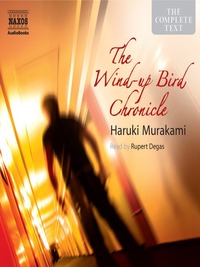Take a photo of a barcode or cover
One of my favorites. Mysterious, surreal, and a page turner; it keeps making me wanting to turn the page to know what will happen next. It's unpredictable, and each character have their own story to tell. There's some parts that I couldn't understand, but that what excites me, and of course there's no explanation in the end. Though some parts are boring, especially in book three and the zoo animals chapter, but still, this book is one of the most unforgettable and memorable book I've ever read.
mysterious
reflective
slow-paced
Plot or Character Driven:
Character
Strong character development:
Complicated
Loveable characters:
No
Diverse cast of characters:
Yes
Flaws of characters a main focus:
Yes
challenging
dark
mysterious
reflective
slow-paced
Plot or Character Driven:
Character
Strong character development:
No
Loveable characters:
No
Diverse cast of characters:
No
Flaws of characters a main focus:
Yes
challenging
hopeful
inspiring
mysterious
reflective
sad
slow-paced
Plot or Character Driven:
Plot
Strong character development:
Complicated
Loveable characters:
Yes
Diverse cast of characters:
Complicated
Flaws of characters a main focus:
Yes
I really liked it but it is like a black hole in my memory it took me ages to get through it but I remember enjoying it. The plot line is so subtle you wouldn’t notice it half the time and most of it is just stuff happening to the main character
Trying to explain The Wind-Up Bird Chronicle is a bit like trying to recount a dream after a night of dodgy sushi—you know it was intense, weirdly symbolic, and probably meaningful, but somewhere between the bottom of a well and a clairvoyant named Malta Kano, you start questioning your own grip on reality.
The story begins, innocently enough, with our ever-apathetic protagonist, Toru Okada, searching for his missing cat. Classic Haruki Murakami. But don’t be fooled. What follows is a wild plunge into a surreal Tokyo underworld filled with psychic sisters, sinister sex workers, war crimes, mysterious women with names like Nutmeg, and—yes—a lot of wells. As in, literal wells. Metaphorical wells. Emotional wells. If you’ve got well-phobia, turn back now.
There’s an ambitious core here—a philosophical exploration of identity, trauma, and fate—and I was genuinely fascinated by some of the more grounded elements, particularly the historical flashbacks to the Japanese-Chinese conflicts during WWII. Those scenes hit hard, with a brutality and clarity that stood out amidst the dream-fog of the rest of the book.
But then the wheels (or birds?) start to come off. There are just so many characters, most of whom are quietly having identity crises and quietly speaking in riddles. After a while, it starts to feel like Haruki Murakami was collecting oddballs like Pokémon, throwing them into the story to see which ones would stick. (Spoiler: most don’t.) Honestly, half of them could’ve merged into one and I wouldn’t have noticed—they’re all variations of lonely, emotionally stunted vessels whispering about pain and metaphysics.
And then there’s the women. Ah, yes. The Haruki Murakami Woman™ makes her obligatory appearance—or five. All ethereal, broken, sexually mysterious, and in desperate need of being saved. May Kasahara, Kumiko Okada, Creta Kano, Nutmeg, Malta Kano… I started confusing them halfway through, and I’m pretty sure Haruki Murakami did too. They all orbit around Toru Okada, feeding his introspection, offering cryptic wisdom, and occasionally stripping for reasons I can only assume are meant to be “deep.”
Stylistically, it’s classic Haruki Murakami: strange yet elegant, heavy with symbolism, beautifully detached, and occasionally frustratingly vague. Themes circle like wind-up birds themselves—solitude, reality vs. illusion, the scars of history, the cycle of fate—all compelling stuff, but never fully crystallised. By the end, I wasn’t sure what had actually happened or whether I was meant to know. Maybe that’s the point. Or maybe it’s just vibes.
In the end, The Wind-Up Bird Chronicle is a moody, meandering fever dream. It’s undeniably interesting—and you do keep reading, if only to see what on earth he’ll throw in next—but it left me more puzzled than fulfilled. If you like your fiction surreal, philosophical, and a bit exhausting, this one’s for you. For everyone else… maybe ease into the Haruki Murakami multiverse with something a little less well-obsessed.
The story begins, innocently enough, with our ever-apathetic protagonist, Toru Okada, searching for his missing cat. Classic Haruki Murakami. But don’t be fooled. What follows is a wild plunge into a surreal Tokyo underworld filled with psychic sisters, sinister sex workers, war crimes, mysterious women with names like Nutmeg, and—yes—a lot of wells. As in, literal wells. Metaphorical wells. Emotional wells. If you’ve got well-phobia, turn back now.
There’s an ambitious core here—a philosophical exploration of identity, trauma, and fate—and I was genuinely fascinated by some of the more grounded elements, particularly the historical flashbacks to the Japanese-Chinese conflicts during WWII. Those scenes hit hard, with a brutality and clarity that stood out amidst the dream-fog of the rest of the book.
But then the wheels (or birds?) start to come off. There are just so many characters, most of whom are quietly having identity crises and quietly speaking in riddles. After a while, it starts to feel like Haruki Murakami was collecting oddballs like Pokémon, throwing them into the story to see which ones would stick. (Spoiler: most don’t.) Honestly, half of them could’ve merged into one and I wouldn’t have noticed—they’re all variations of lonely, emotionally stunted vessels whispering about pain and metaphysics.
And then there’s the women. Ah, yes. The Haruki Murakami Woman™ makes her obligatory appearance—or five. All ethereal, broken, sexually mysterious, and in desperate need of being saved. May Kasahara, Kumiko Okada, Creta Kano, Nutmeg, Malta Kano… I started confusing them halfway through, and I’m pretty sure Haruki Murakami did too. They all orbit around Toru Okada, feeding his introspection, offering cryptic wisdom, and occasionally stripping for reasons I can only assume are meant to be “deep.”
Stylistically, it’s classic Haruki Murakami: strange yet elegant, heavy with symbolism, beautifully detached, and occasionally frustratingly vague. Themes circle like wind-up birds themselves—solitude, reality vs. illusion, the scars of history, the cycle of fate—all compelling stuff, but never fully crystallised. By the end, I wasn’t sure what had actually happened or whether I was meant to know. Maybe that’s the point. Or maybe it’s just vibes.
In the end, The Wind-Up Bird Chronicle is a moody, meandering fever dream. It’s undeniably interesting—and you do keep reading, if only to see what on earth he’ll throw in next—but it left me more puzzled than fulfilled. If you like your fiction surreal, philosophical, and a bit exhausting, this one’s for you. For everyone else… maybe ease into the Haruki Murakami multiverse with something a little less well-obsessed.
First two chronicles were fab. Solitude common Murakami and isolation theme - the chapters when main character goes down a well really highlight this. Loved descriptions of kimono, creta & Malta in first chronicles. Third chronicle was one too many, seemed more wayward and irrelevant. nutmeg and cinnamon interesting as was ushi. Good but a bit long also some pretty gruesome killing scenes.
reflective
medium-paced
This is my second Murakami book, and in classic Murakami fashion, I still had no idea what had happened even after reading the entire thing. It at times gives me the feeling that I’m reading something akin to Virginia Woolf- but not quite, because with Wolfe I could sense the realness and the core of what she was trying to say. With Murakami though I am as lost as ever. I would love to know what he was thinking in his mind while writing - it must have taken an extraordinary mind to dream up a story so fantastical and nonsensical yet feels like it could almost make complete sense on some deeper level.
challenging
mysterious
reflective
slow-paced
Plot or Character Driven:
Character
Strong character development:
Yes
Loveable characters:
No
Diverse cast of characters:
Yes
Flaws of characters a main focus:
Yes






